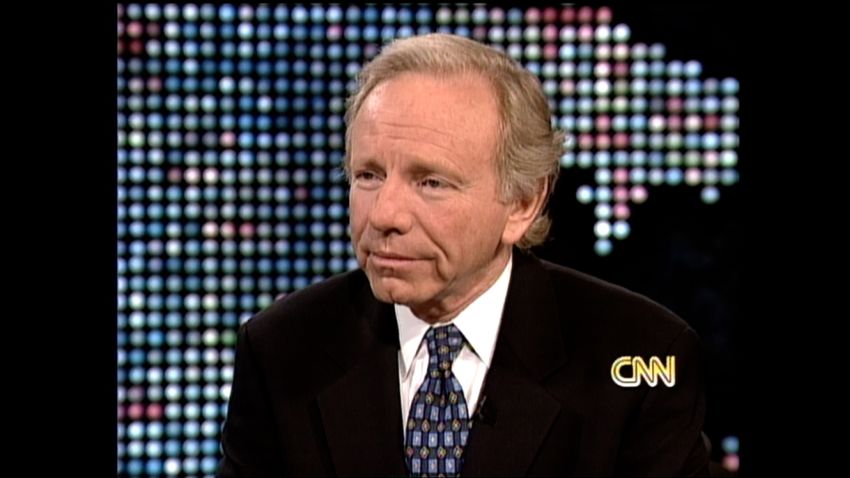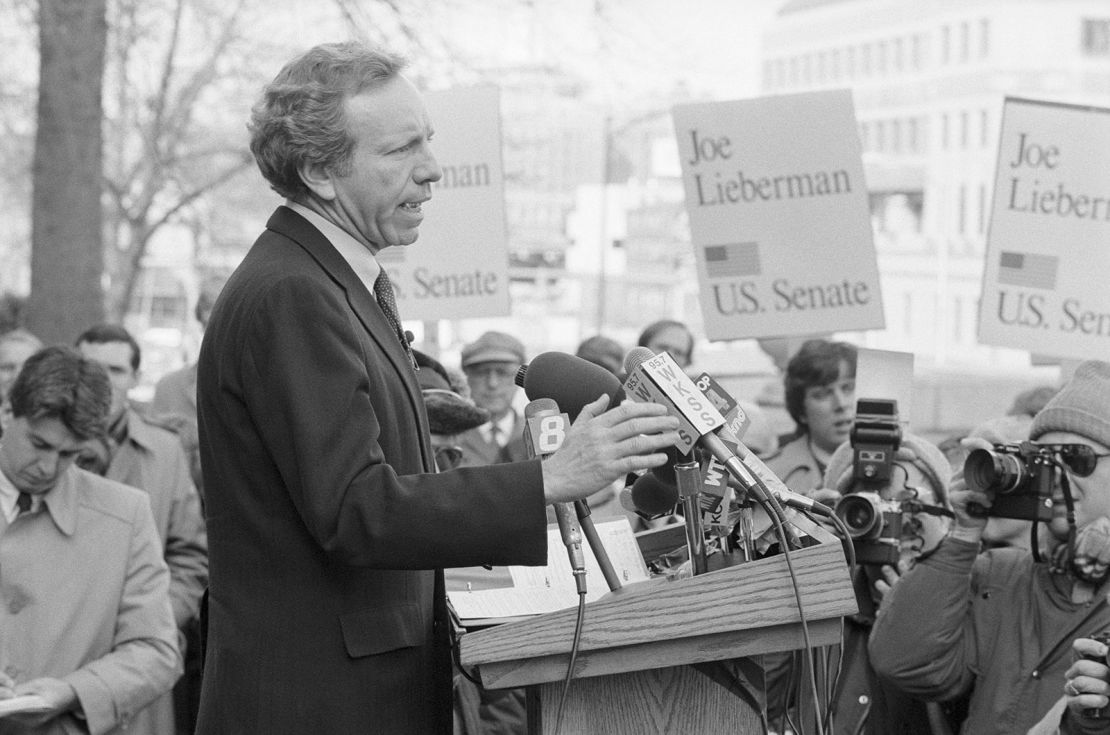
CNN
—
Joe Lieberman, the first Jewish vice-presidential nominee of a major party, whose conscience and independent streak later led him on a journey away from his home in the Democratic Party, has died at 82, according to a statement from his family.
The former Connecticut senator passed away Wednesday due to complications from a fall in New York. His wife Hadassah and members of his family were by his side.
The peak of Lieberman’s political career came when he was chosen by Democratic presidential nominee Al Gore in 2000 as his running mate. The disputed election was eventually decided by the Supreme Court in favor of then-Texas Gov. George W. Bush. Lieberman had hailed his selection as a historic breakthrough for Jewish Americans.
On many issues, like abortion and economic policy, Lieberman was a mainstream Democrat. And he will be remembered as one of the last major statesmen of an era when true bipartisanship felt possible in Washington, before today’s polarized times.
In his farewell speech to the Senate in 2012, Lieberman bemoaned what politics had become.
“It is the partisan polarization of our politics which prevents us from making the principled compromises on which progress in a democracy depends, and right now, which prevents us from restoring our fiscal solvency as a nation,” Lieberman said. “We need bipartisan leadership to break the gridlock in Washington that will unleash all the potential that is in the American people.”

Lieberman’s political evolution accelerated in the aftermath of the September 11, 2001, attacks, his hawkish instincts on foreign policy put him increasingly at odds with his own party, and he was a strong supporter of the US invasion of Iraq in 2003, which led to a prolonged conflict that many of his fellow Democrats came to oppose.
He mounted his own campaign for the Democratic presidential nomination in 2004, but the run failed to take off, further increasing his distance from the party’s core base voters after he refused to repudiate the war in Iraq. That position also led to him losing the Democratic primary for his own seat in 2006. But he ran as an independent anyway and won the election, returning to the Senate.
In 2008, Lieberman infuriated Democrats even more by showing up at the Republican National Convention in support of his dear friend, Arizona Sen. John McCain, that year’s Republican presidential nominee. Many Democrats perceived an act of treachery when he criticized Sen. Barack Obama, the Democratic nominee, as “a gifted and eloquent young man” but warned that he was too inexperienced to be president.
McCain, who died in 2018 and was eulogized by Lieberman, later admitted that he wished he had chosen Lieberman as the vice presidential nominee on his ticket instead of Alaska Gov. Sarah Palin, whose selection sparked an extraordinary outburst of support from the Republican base but later became a liability as her deep inexperience on the national stage harmed McCain’s losing campaign.

Lieberman’s move to the right represented an intriguing political reinvention. But perhaps it should not have been a complete surprise.
After years of diligent service in the Senate, Lieberman rocketed to public attention in 1998 during the scandal over President Bill Clinton’s affair with White House intern Monica Lewinsky. In a stunning public condemnation of Clinton by a fellow Democrat, Lieberman slammed his friend’s behavior as “immoral,” “disgraceful” and deserving of “public rebuke and accountability.” His speech from the Senate floor was seen by many Democrats at the time as an act of disloyalty. Still, Lieberman later voted after a Senate trial not to convict Clinton for high crimes and misdemeanors after he was impeached by the House of Representatives.
While Lieberman alienated many Democrats with his speech – it was also instrumental in then-Vice President Gore’s decision to choose him as his running mate. Gore wanted to signal to Americans that while he was embracing the popular Clinton legacy, especially on the economy, he did not approve of the former president’s personal conduct in a campaign that Bush was shaping as an attempt to restore “honor and dignity” to the White House.
Lieberman will also be remembered for his proud observance of his Orthodox Jewish faith, declining to work on Shabbat. But he famously made an exception in 2009, walking five miles from Georgetown to the US Capitol to vote against a Republican attempt to cut Medicare spending.
In his final years, Lieberman was angering Democrats yet again. He was the founding chairman of the No Labels Group that has been considering an independent presidential ticket that may Democrats fear could splinter President Joe Biden’s vote and help elect presumptive Republican nominee former President Donald Trump in November.

Lieberman describes the ‘hardest thing’ he’s ever done in public life (1998)
Lieberman’s family broke the news of his passing in a statement that paid tribute to his groundbreaking American story.
“Former United States Senator Joseph I. Lieberman died this afternoon, March 27, 2024, in New York City due to complications from a fall. He was 82 years old. His beloved wife, Hadassah, and members of his family were with him as he passed,”the statement said.
“Senator Lieberman’s love of God, his family, and America endured throughout his life of service in the public interest,” the statement said.
Lieberman continued searching for a middle way in politics through the end of his life. But he insisted that the No Labels initiative would not go ahead if it ended up helping Trump.
“We’re not going to do this if we think that this will help reelect Trump, because our mission is to bring bipartisan problem-solving government back to Washington,” Lieberman said in an interview with CNN’s Edward-Isaac Dovere in January, “and Trump obviously does not represent that kind of government.”
Lieberman said his problems with Trump ran deeper than his political orientation.
“Many people say he’s a threat to democracy. Fair enough. But to me, what he’s really a threat to is the rule of law, which is the great guarantor of our freedom, of order, of our prosperity, of everything,” Lieberman said, citing Trump’s lawsuits after the 2020 election and connection to the January 6, 2021, attack on the Capitol by the former president’s supporters.
Lieberman also drew a distinction between the current and previous presidents.
“Much as I feel like Joe Biden has moved too far to the left and the Democratic Party has moved further to the left, and they have a lot of influence on him, if we don’t run the ticket, the choice between Trump and Biden for me personally is easy,” Lieberman said. “I will enthusiastically support Biden because, in just the most baseline way, his whole career says he respects the rule of law.”

Lieberman was born in Stamford, Connecticut, on February 24, 1942. He went to Yale University — where it was clear a political career beckoned as he was nicknamed “Senator.” He later attended Yale Law School and in 1968, he ran the Connecticut presidential campaign of former Attorney General Robert Kennedy, until the candidate was assassinated.
Lieberman was elected to the Connecticut Senate in 1970 and rose to the position of majority leader. After a spell as attorney general of his home state, he became the first Orthodox Jew elected to the US Senate in November 1988.
Lieberman was married twice, including to Hadassah who survives him.
Remembered by friends and former foes
Allies and former opponents alike were quick to remember the political maverick on Wednesday.
Gore said he was “profoundly saddened” by the passing of his former running mate in a statement posted to X, adding that “it was an honor to stand side-by-side with him on the campaign trail.”
“First and foremost, he was a man of devout faith and dedication to his family. My heart goes out to Hadassah, Hana, Matt, Rebecca, Ethan, his sisters, and all those grieving his loss. Joe was a man of deep integrity who dedicated his life to serving his country. He was a truly gifted leader, whose affable personality and strong will made him a force to be reckoned with,” Gore said.
Bush in a statement said that as he and his wife, Laura, pray for the Lieberman family, “we also pray that Joe’s example of decency guides our Nation’s leaders now and into the future.”
“He engaged in serious and thoughtful debate with opposing voices on important issues. And in both loss and victory, Joe Lieberman was always a gentleman. I’m grateful for Joe’s principled service to our country and for the dignity and patriotism he brought to public life,” the former president and Lieberman’s former rival said.
Obama in a statement said that while he and Lieberman “didn’t always see eye-to-eye,” the former senator had an “extraordinary career in public service, including four decades spent fighting for the people of Connecticut.”
“He also worked hard to repeal ‘Don’t Ask Don’t Tell’ and helped us pass the Affordable Care Act. In both cases the politics were difficult, but he stuck to his principles because he knew it was the right thing to do,” Obama said.

Senate Majority Leader Chuck Schumer in a social media post said, “I am devastated to hear about the passing of our former colleague Senator Joe Lieberman. My heart is with his beloved wife Hadassah and his family, and I am praying for all who knew and loved him.”
Sen. Lindsey Graham, who was part of the so-called “Three Amigos” along with fellow senators Lieberman and McCain, said the news of his friend’s passing was “devastatingly sad.”
“The good news, he is in the hands of the loving God. The bad news, John McCain is giving him an earful about how screwed up things are,” Graham also wrote.
No Labels in a statement called Lieberman the “moral center” of the centrist group’s movement and said his “unexpected passing is a profound loss for all of us.”
“Senator Lieberman leaves behind a void that cannot be filled. But we are honored to have known him and we hope his family can find comfort in the difficult days ahead knowing the tremendous impact that he had,” the group said.
This story has been updated with additional developments.
CNN’s Rashard Rose, Manu Raju, Kristin Wilson, Jeff Zeleny and Brian Rokus contributed to this report.